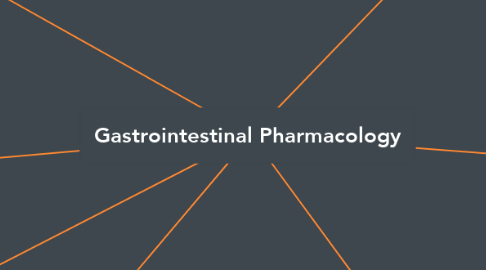
1. Control of Gastric Acidity
1.1. Antacids - Gastric Acid Neutralizers
1.1.1. Carbonates or Hydroxides of:
1.1.1.1. AL
1.1.1.1.1. Al(OH),
1.1.1.2. Mg
1.1.1.2.1. Mg(OH)2
1.1.1.3. Ca
1.1.1.3.1. CaCO3
1.1.1.4. Na
1.1.1.4.1. NaHCO3
1.1.2. Combination Drugs
1.1.2.1. Mylanta
1.1.2.2. Maalox
1.2. Gastric Cytoprotectants
1.2.1. Sucralfate
1.2.2. Misoprostol
1.2.3. Bismuth Compounds
1.3. H2 Receptor Blockers
1.3.1. Cimetidine
1.3.2. Famotidine
1.3.3. Ranitidine
1.4. Proton Pump Inhibitors (PPIs) - "azoles"
1.4.1. Omeprazole
1.4.2. Esomeprazole
1.4.3. Pantoprazole
1.4.4. Lansoprasole
1.4.5. Rabeprazole
1.4.6. Dexrabeprazole
1.5. Antibiotics - H. Pylori eradication
1.5.1. Amoxicillin
1.5.2. Clarithromycin
1.5.3. Metronidazole
1.5.4. Tinidazole
1.5.5. Tetracycline
2. Anti-Diarrheals
2.1. Nonspecific
2.1.1. Absorbants
2.1.1.1. Isaphgula
2.1.1.2. Methylcellulose
2.1.1.3. Kaolin
2.1.1.4. Pectin
2.1.2. Anti-secretory drugs
2.1.2.1. Rasecadotril
2.1.2.2. Bismuth subsalicylate (Pepto-Bismol)
2.1.2.3. Anticholinergics
2.1.2.4. Ocreotide
2.1.3. Antimotility
2.1.3.1. Opioids (link goes to Opioid Mind-map)
2.1.3.1.1. Codeine
2.1.3.1.2. Loperamide (does not X BBB)
2.1.3.1.3. Diphenoxylate
2.2. Probiotics (help with replacing bacterial flora lost in diarrhea) - (you can skip for PT 747)
2.2.1. Lactobacillus sp
2.2.2. Strep. faecalis
2.2.3. Bifidobacterium bifidum
2.2.4. Enterococcus sp.
2.2.5. Others
2.3. Drugs for Inflammatory Bowel Disease (you can skip for PT 747)
2.3.1. 5-ASA compounds
2.3.1.1. Sulfasalazine
2.3.1.2. Mesalazine
2.3.1.3. Balsalazide
2.3.1.4. Olsalazine
2.3.2. Glucocorticoids
2.3.2.1. Prednisolone
2.3.2.2. Hydrocortisone (enema)
2.4. Antibiotics are used for infective diarrhea - See chemotherapy of microbials
3. Laxatives (a.k.a. Purgatives, Cathartics)
3.1. Bulk forming (Dietary fiber)
3.1.1. Bran
3.1.2. Psyllium
3.1.3. Isapghula
3.1.4. Methylcellulose
3.2. Stool Softener
3.2.1. Docusates
3.2.2. Liquid Paraffin
3.3. Stimulant Purgatives
3.3.1. Diphenylmethanes
3.3.1.1. Bisacodyl
3.3.1.2. Sod. picosulfate
3.3.1.3. Phenolphthalein - used over 100 yrs as laxative but now discontinued over concerns of Carcinogenicity - replaced by Bisacodyl & Senna Extracts in OTC preparations
3.3.2. Anthraquinones
3.3.2.1. Senna
3.3.2.2. Cascara sagrada
3.3.3. 5-HT4 Agonist (Chronic Constipation)
3.3.3.1. Prucalopride
3.3.4. Fixed Oil
3.3.4.1. Castor Oil
3.4. Osmotic Purgatives
3.4.1. Mag. sulfate (Epson Salts)
3.4.2. Mag. hydroxide (Milk of Magnesia)
3.4.3. Lactulose
3.4.4. Sod. sulfate
3.4.5. Sod. phosphate
3.4.6. Sod. potassium tartarate
4. Important Side-Effects of Gastric Acid Regulators
4.1. Antacids
4.1.1. Constipation w/Aluminum Hydroxide
4.1.1.1. Sometimes people will take these drugs for diarrhea because they incidentally find Aluminum based Drugs to help the diarrhea.
4.1.2. Diarrhea w/Magnesium hydorxide
4.1.3. Abdominal Distension with Calcium Carbonate
4.1.4. Acid Rebound with CaCO3 when stopped
4.1.5. Milk-Alkali Syndrome
4.2. Cytoprotectants
4.2.1. Misoprostol can cause Diarrhea & is contraindicated in Pregnancy
4.2.2. Bismuth Compounds contraindicated in Aspirin Allergy
4.3. H2-Receptor Antagonists
4.3.1. Ranitidine is recalled by FDA due to NDMA concerns - if you find old stock with patient, it needs to be discarded.
4.3.2. Blocks absorption of other drugs that require an acid-environment to get absorbed in the stomach. Examples - antifungals e.g. Ketoconazole.
4.3.3. At prescription Strength - may cause confusion, hallucinations, delirium, & slurring
4.3.4. Cimetidine
4.3.4.1. Gynaecomastia
4.3.4.2. Galactorrhea
4.4. PPIs
4.4.1. C-diff Infections
4.4.2. Bone Fractures
4.4.3. Stevens-Johnson syndrome/Toxic epidermal necrolysis (TEN/SJS) - Rare Cases
5. Relevance to Rehabilitation Practice
5.1. Relieves Gastrointestinal Problems
5.1.1. Enhances participation
5.2. May cause Fractures even in long run
5.3. Critical Role in Certain Patients
5.3.1. Treatment of Severe Diarrhea in Newborns is life-saving - Wokring with this population, it is important to notify physicians when such diarrhea is noticed
5.3.2. Treatment of Gastric Ulcer in severe trauma & Burns
5.3.3. Patient Education
5.3.3.1. Avoid overuse of laxatives, Antacids
5.3.3.2. Risk of fecal impaction in Spinal Cord Injured patients if opioids are especially used.
5.3.3.3. Avoid Overuse or indiscriminate use of opioids - it can lead to severe consiptation
5.3.3.4. Risk of Fractures with long-term PPI use
5.3.3.5. Risk of C-Difficule with Indiscrimate of use of Antibiotics
5.3.3.6. Other risks and side-effects as noted.
5.4. Precautions in Antacid Usage
5.4.1. Antacids
5.4.1.1. Renal Insufficiency
5.4.1.2. Drug Interactions
5.4.1.3. Milk-Alkali Syndrome
5.4.2. Watch for non-specific but uncharacteristic symptoms & signs during your care
